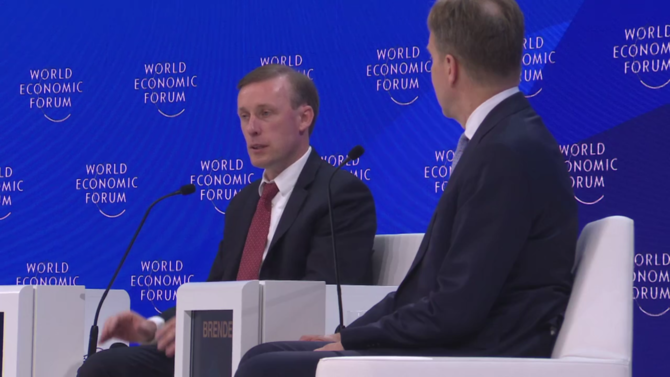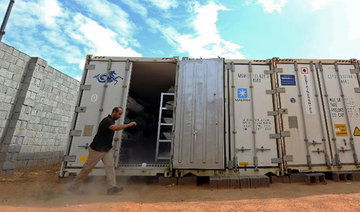DAVOS: Washington is “not looking for a regional conflict” in the Middle East, Jake Sullivan, the US national security adviser, told the World Economic Forum in Davos on Tuesday, against a backdrop of mounting turmoil in the Red Sea.
“Through a combination of steady deterrence and steadfast diplomacy we seek to stop the spread of conflict and create the conditions for de-escalation,” Sullivan said in a special address.
The administration of US President Joe Biden was focused on “moving towards greater integration and stability in the region,” Sullivan said, but cautioned that the situation in the Middle East was likely to get worse before it gets any better.
“We are eagerly working with partners throughout the region to try and pursue a pathway. But in the meantime, we have to guard against and be vigilant against the possibility that, in fact, rather than heading towards de-escalation, we are on a path of escalation that we have to manage.”
Sullivan’s comments come just days after a US-led coalition carried out strikes on Houthi positions in Yemen in retaliation for the Iran-backed militia’s recent spate of attacks on commercial shipping routes in the Red Sea.
On Sunday, the US said it had shot down a missile fired towards one of its warships from a Houthi area of Yemen. A day later, the group said they had carried out a ballistic missile strike on a US-owned cargo ship in the Gulf of Aden. The US has since retaliated.
Several vessels have been targeted by the militia’s fighters since November in protest at Israel’s war with Hamas. The Houthis say they are targeting vessels which are Israeli-owned, flagged or operated, or are heading to Israeli ports.
Indicating that further attacks on shipping were likely, necessitating further strikes against the Houthi targets, Sullivan said: “We did not say when we launched our attacks that (Houthi strikes) were going to end once and for all.”
Sullivan said that a halt to Houthi attacks on shipping would depend on the cooperation of “those with influence in Tehran” as well as the support of US allies in the Middle East.
Turning to the conflict in Gaza, Sullivan said the US envisaged a post-war scenario where Israel continued toward normalization with its Arab neighbors, which he said was the only path to lasting, guaranteed security for Israel, as well as a state for the Palestinians.
“I know that in this moment when there’s so much anger and pain and so much uncertainty it’s hard to imagine, but it really is the only path that provides peace and security for all.”
Sullivan said the world “needed a Palestinian state” and that this was achievable “not years from now, but in the short term, if everyone takes courageous decisions and chooses that path.”
Israel launched its military operation in Gaza in retaliation for the unprecedented Hamas attack of Oct. 7, in which the group’s fighters breached the Israeli border in several places, killing some 1,200 people, most of them civilians, and taking another 240 hostage.
More than a hundred days of fighting, incessant bombardment, and restrictions on the flow of humanitarian aid into the territory has resulted in more than 24,000 deaths, according to the Hamas-run health ministry.
The conflict has since spread to other parts of the Middle East, with groups allied with Iran and Hamas carrying out their own attacks, including exchanges of fire between Israel and Lebanon’s Hezbollah, attacks on US interests in Iraq, and Israeli strikes against Syria.
While reiterating Washington’s support for Israel’s right to defend itself following the Oct. 7 attacks carried out by Hamas militants, Sullivan called on the Israeli government to abide by its obligations under international law.
“This (right) does not lessen at all Israel’s responsibility to conduct its campaign in a way that upholds international humanitarian law and abides by the moral and strategic necessity to distinguish between terrorists and innocent civilians.”
Sullivan was among a senior US delegation, including Secretary of State Antony Blinken, which met with Ukraine’s President Volodomyr Zelensky in Davos earlier on Tuesday.
During his address, Sullivan reiterated that Washington was fully supportive of the Ukrainian war effort and said he was confident the US Congress would approve more aid for Kyiv “after a lot of twists and turns,” adding that the Biden administration was “seeking to get that done in the coming weeks.”
Sullivan also made reference to growing tensions between the US and China and said Washington’s restrictions on Beijing’s import of advanced chips was about ensuring American national security and not a barrier to commerce between the two countries.
“I want to be clear that these tailored measures are not a technology blockade. They do not seek to, nor in fact do they, restrict broader trade and investment,” he said.
He added that the restrictions were a “broad carve-out for commercial chips, the kind of chips that can help power economic progress,” and that strategic competitors with the US “should not be able to exploit American technologies to undermine our national security or that of our allies and partners.”



























